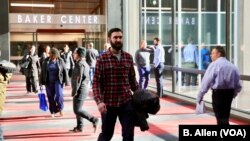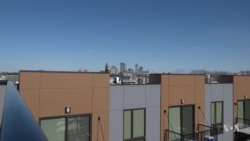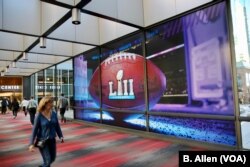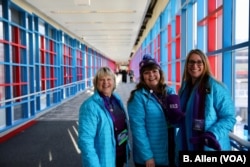February in Minneapolis, Minnesota, is cold — the kind of cold that stings your face and burns your lungs as soon as you walk outside. Today’s temperature is minus 10 degrees Celsius, and local business owner Brad Rohles is getting ready for work.
Boots? Check.
Heavy jacket? Check.
Gloves? Check.
Bomber hat? Check.
“We are in Minnesota,” Rohles said, “so when it’s really cold outside sometimes, it can hit minus 20 degrees. And for a lot of people, that’s a little too cold to be walking around in the elements.”
WATCH: World's Longest Skyway Gives Minneapolis Residents a Break From Harsh Winter
Built for winter
Luckily for locals, Minneapolis is a city built to handle the worst that winter dishes out.
Snow plows patrol roads and highways while smaller Bobcat bulldozers remove slushy buildup as fast as it hits the ground. The city can easily get more than 130 centimeters of snow a year, and it is quickly removed from local roads with an almost ruthless efficiency. That only leaves the temperatures and wind chill to deal with.
“Bright, sunny days in the winter are always the worst,” Rohles said. “They are always the coldest.”
The Skyway
While minus 10 degrees Celsius is about average for this time of year in Minneapolis, the city has its way of handling that: the Skyway. Here, the majority of downtown buildings are connected by elevated and enclosed pedestrian footbridges — the longest continuous system of skywalks in the world. The Skyway allows residents to walk in climate-controlled comfort for more than 18 kilometers across 80 full city blocks.
“All in all, I think I step outside for about 30 seconds in any given day, if I have to,” Rohles said.
The Minneapolis Skyway is more than just a way for residents to get to work; it’s a city within a city and, importantly, it allows locals to deal with the weather in their own way. It has shops and bars, restaurants and hotels. It connects business and sports arenas, stores and apartment buildings. There are a thousand different things you can do within the Skyway without actually having to step foot outside.
Sharri Murphy is another Minneapolis resident who is downtown volunteering for this week’s Super Bowl festivities.
“It makes it convenient for everybody to get to places,” Murphy explained. “I used the light rail to get downtown today, and then to the Skyway, so I’ve only been outside for about a block and a half. It’s an easy way to do it, to enjoy the city, and get to everything.”
Fittest American city
But Rohles is quick to add that just because he has the luxury of remaining indoors almost all day long, that doesn’t mean he does.
“We are one of the most active places in the country, and it doesn’t matter what the weather is,” he said. “It could be minus 20 degrees outside and you’re driving down the road, and you’re going to see more bicycles than cars on the street. People are running and training for marathons in the middle of January.”
This is key to understanding the mindset of Minneapolis. The city was named the fittest in America by the American College of Sports Medicine in 2017, a remarkable achievement considering the weather residents have to deal with. Minnesota is known as “the land of 10,000 lakes,” which means locals have an abundance of possible outdoor activities regardless of the season; swimming in the summer becomes ice fishing in the winter.
But for now, Rohles is happy to make the famous Minneapolis Skyway his second home.
VOA's Arash Arabasadi contributed to this report.








